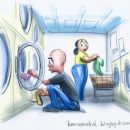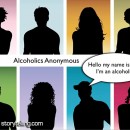I’d like to share a couple of things. One is an idea from the book The Spirituality of Imperfection. “In truth, there are no new stories. Stories become ‘new’ to us – when something – in our own experience – makes us ready to hear them.”
Another concept comes from the book The Storytelling Animal. Every single story in the world is essentially the same story of heroes confronting adversity or trauma, and trying to overcome. The idea is no matter how far we travel back into history, we always find the same astonishing thing: their stories are just like ours.
Thank goodness stories aren’t an endless set of variables. Otherwise conversions would never happen, and treatment and healing could never occur. Imagine if everybody was completely unique. It would be impossible for physicians, psychologists, attorneys or clergy to address anything.
The fact that stories are predictive, and have a pattern is a good thing. It’s that stories are familiar, they are a river that runs through humanity since the beginning of time. This is the common connection we all feel to them. Yet, to each individual, a story is unique and special because it’s personal to them.
That’s the power of stories. Unique – yet the same. Something to think about.






Awhile ago, my director sent me this article in AdWeek that describes the 7 Different Story Types: Which One Is Your Brand?
http://www.adweek.com/news/advertising-branding/7-basic-types-stories-which-one-your-brand-telling-144164
The author says this “It used to be a one-way thing, where the company would say, ‘We’re this,’ and invite no feedback. Now, in the age of social media, that’s impossible.” She pointed to Shell’s recent crowdsourced posters and the Walmart/Pitbull incident as evidence of disasters that can happen when brands lose control of their stories.
What do you guys do to maintain control of your clients’ uniquely-the-same stories?